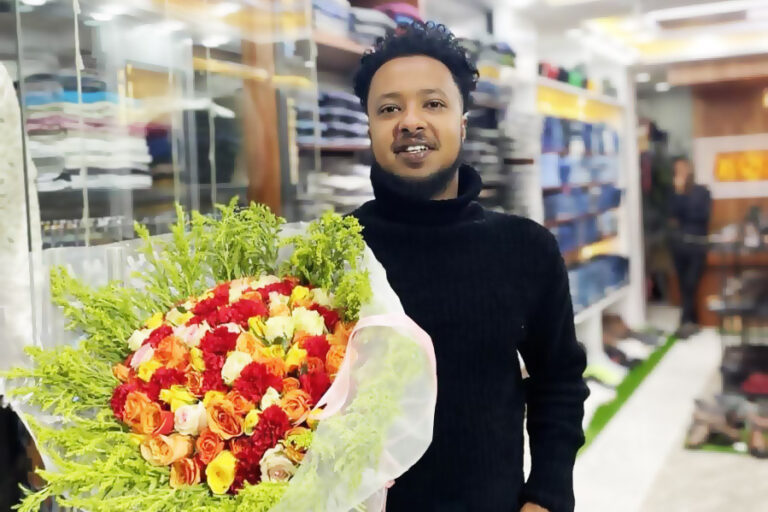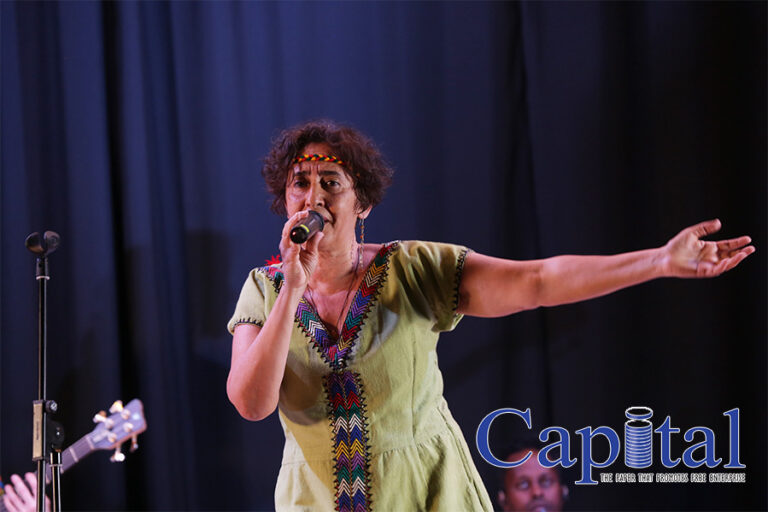Desperately needed rains across the Horn of Africa have so far failed to materialise, almost a month into the current rainy season, and if these conditions continue, along with stagnant and even decreasing humanitarian aid, the number of hungry people due to drought could spiral from the currently estimated 14 million to 20 million through 2022, the United Nations World Food Programme (WFP) warned today.
With Somalia facing the risk of famine, half a million Kenyans one step away from catastrophic levels of hunger and malnutrition rates in Ethiopia well above emergency thresholds, time is fast running out for families who are struggling to survive.
“We know from past experience that acting early to avert a humanitarian catastrophe is vital, yet our ability to launch the response has been limited due to a lack of funding to date,” said Michael Dunford, WFP’s Regional Director for Eastern Africa. “WFP and other humanitarian agencies have been warning the international community since last year that this drought could be disastrous if we didn’t act immediately, but funding has failed to materialise at the scale required.”
The situation has been compounded by the fallout of conflict in Ukraine, with the cost of food and fuel soaring to unprecedented highs. Drought-affected countries across the Horn of Africa are likely to be the hardest hit by impacts of the conflict – the cost of a food basket has already risen, particularly in Ethiopia (66 percent) and Somalia (36 percent) which depend heavily on wheat from Black Sea basin countries, and the disruption in imports further threatens food security. Shipping costs on some routes have doubled since January 2022.
During the 2016/17 drought in the Horn of Africa, catastrophe was avoided through early action. Humanitarian assistance was scaled up before there was widespread hunger; saving lives and averting a devastating famine. In 2022, due to a severe lack of resourcing, there are growing fears that it won’t be possible to prevent the looming disaster – and millions will suffer as a result.
WFP last appealed for desperately needed funding in February yet less than 4 percent of what was needed was raised. Over the next six months, WFP needs US$473 million to scale-up assistance and save lives across the three countries – Ethiopia, Kenya and Somalia.
Millions across the horn of Africa pushed closer to catastrophe each day
PRIME WORKFORCE
For over a decade now, the R&D Group has been transforming the Ethiopian business landscape with its visionary next-generation enterprises model with unrivaled efficiencies by providing highly refined business solutions tailored to each and every one of their clients. Over the years, the firm has partnered with ORTEC sports, Africa People Advisory Group, the Ethiopia-Netherlands Business Association, Ethio-Jobs, Enat bank, Samasource and Africa HR solutions, to mention but a few.
As the consultancy firm continues to grow from strength to strength by helping companies run better through a prime workforce, Capital reached out to Rahel Boon-Dejene, founding managing director of the firm, for insights on the genesis of the firm and current projects that the firm is involved in. Excerpts;
Capital: Tell us something about yourself?
Rahel Boon-Dejene: My name is Rahel Boon-Dejene. I was born in Bale-Robe and spent most of my adult life in The Netherlands. I am a proud mother of five beautiful children and a social entrepreneur who is driven by people’s ability to contribute to societal change.
Capital: Why did you become a social entrepreneur?
Rahel Boon-Dejene: I actually started my first business in The Netherlands in 2009 as I was unable to find suitable job after my master’s study. Despite my academic performance, the interest I had on sustainable businesses did not fit the capitalist environment I was living in. I therefore started RBD Consultancy, with the aim to promote responsible business practices and social entrepreneurship. I soon realized that the Dutch market is saturated and that my skills are more valued in Ethiopia. In partnership with a software company called ORTEC, a firm specialized in optimizing operational processes, I started the R&D Group.
Capital: What does the R&D Group do?
Rahel Boon-Dejene: Being from Ethiopia, I had the desire to come back and find a way to contribute. Together with my co-founder Wondwesen Zewdie, I started the R&D Group with a shared desire to connect talented Ethiopian professionals to the rest of the world, by recruiting and developing the skills of young professionals and entrepreneurs.
With regards to what we do, I would simply describe our firm as a purpose-driven organization that continuously looks for opportunities to contribute to job creation, entrepreneurship development and skills advancement for professionals and business owners in Ethiopia.
We aim to assist organizations in increasing their efficiency and business performance. We serve our clients through our Academy, business development services, consultancy, and business process outsourcing services. By offering our customers with wide business solutions, we aim to create ‘new approach’ to business challenges to organizations and to professionals. Since our inception in 2010, we have created job opportunities for over five hundred university students and fresh graduates, trained over six thousand professionals.
Capital: What led you to organize Parnters4Change 2022: Dare2Share event in January? Describe to us a snapshot of the event?
Rahel Boon-Dejene: Partners4Change was founded in 2011 in The Netherlands with the aim to bring diverse players together to learn from each other and to explore new strategies for sustainable partnership. Ever since, we have been hosting strategic events to empower professionals from all sectors with the tools needed to be more effective sustainability leaders and change-makers in Ethiopia and The Netherlands.
Dare2Share was organized by R&D Group, RBD Consultancy, and ORTEC Sports, in partnership with Africa 118, 251 Communication, CAWEE, MMCY, Excellerent following the most opportune moment of the GREAT ETHIOPIAN HOMECOMING call by the Ethiopian government and P4C’s 10 years anniversary.
Having engaged with different Diasporas communities and being a diaspora led business, we felt we should offer a platform to facilitate partnership between local change agents and diaspora professionals. We wanted to tap into the collective knowledge of the diaspora and local experts to provide innovative solutions for Ethiopia’s current and future challenges. We welcomed over 200 professionals to be inspired, to network, to challenge each other and share their expertise for the greater good.
Under the theme “Connecting diaspora and home-based professionals to make a lasting Impact”, Day 1 aimed to connect Ethiopians who are keen on addressing national and regional challenges through effective public private partnerships. To fulfill the need to develop actionable solutions, we hosted practical cases in the area of digital transformation, Offshore Outsourcing, women leadership, skills and employment, social entrepreneurship and sport for change presented by Ethiopian change makers. Participants joined sessions of their selected cases to provide innovative solutions for challenges raised by these purpose-driven leaders.
Our panel experts who have different background shared cross-cutting opinion in regard to youth employment, private sector development, public-private-partnership, women leadership and digital transformation. These experts are people who actively impacted lives and reflect the voices and faces of countless ordinary people accomplishing extraordinary results. We also use the event to soft-launch our own digital platform called SHARE. SHARE-platform is designed to connect Ethiopian entrepreneurs with (diaspora, international, and local) investors and on-demand experts to accelerate the growth of Ethiopia’s private sector.
Day 2’s theme “Connecting Ethiopian and diaspora experts to create homegrown solutions” was designed to encourage participants to play their role as entrepreneur or expert to participate in economic growth of Ethiopia.
While this day aimed to encourage diaspora community to invest in Ethiopia, it was also a way to inspire them to witness organizational success and essentially promote partnership among the participants. Attendees had the opportunity to network and meet the team who are leading our Entrepreneurship accelerator programs, academy, HR Excellence and outsourcing divisions.
Finally, in collaboration with our selected Ethiopian Outsourcing Association (under formation), we had organized a tech-driven tour to encourage entrepreneurs to invest in Ethiopia. Visiting the offices of these technology entrepreneurs was done so, in order to demonstrate Ethiopian professionals’ ability to serve global clients remotely.
Looking at our survey, we were proud to see that coming to our event provided participants with new ideas, tools and contacts to help them be a more effective change agent. Lastly, we are grateful to Nigusu Tilahun, State Minister of Labor and Skills Ethiopia, and Huria Ali, State Minister of Ministry of Innovation, who graced us with their presence despite their busy schedule. Their presence shows the willingness of these ministries to stimulate partnership among sectors and find innovative ways to create the much needed jobs for the youth
Capital: What is the role of R&D in stimulating Diaspora community to contribute to private sector development?
Rahel Boon-Dejene: In general, we believe that both Ethiopians abroad and here can contribute to the economic development of Ethiopia by utilizing their human and financial resources. Traditionally, diaspora community is considered to support family and friends through remittances, we however see that the accumulated knowledge available among the old and new generation of diasporas can become a catalyst for change. After several years of research, we came to the realization that there is little window of opportunities for these group to be connected to available opportunities in Ethiopia. Next to events like dare2share, our newly launched platform SHARE will allow them to get the necessary information about doing business in Ethiopia, while allowing them to be connected to local businesses that require technical support.
Additionally, our flagship project, Widu Africa portal, encourages diaspora community to utilize remittances to invest in their family and friend entrepreneurs. Implemented by GIZ, WIDU applies an innovative approach that combines funding and coaching to strengthen new and existing small business in Africa, which then leads to the creation of new jobs. The portal aims to taps into the diaspora’s financial and technological development policy potential. This strategy gives Ethiopian entrepreneurs better access to financial assistance and local mentoring. We are happy to work with GIZ to provide an opportunity for small business entrepreneurs in Ethiopia who have friends and families in Europe, particularly Germany, France, Switzerland, Austria, the Netherlands, Sweden, and Norway. Our experienced team provides local entrepreneurs with personalized coaching plan to succeed in their operations.
Capital: From your experience, what are the challenges for the diaspora community to engage in Ethiopia?
Rahel Boon-Dejene: There are several reasons for Diasporas to feel dis-engaged. To start with, I believe it is rather hard to readjust to the way of working in Ethiopia, the longer you live abroad the more difficult it becomes. We somehow get used to the environment in the countries we live and tend to give up faster when things do not go the way we want. It is also challenging to have clear understanding of the opportunities Ethiopia holds for them. This is mainly due to lack of accurate information and the bad experiences of peer diaspora members, which increases our risk adverseness. Furthermore, most of us are driven by the social contribution we want to bring, rather than have a proper business idea to help us crack the code of successful business in Ethiopia. As the idea of social entrepreneurship is not emended in our system, we mostly end up feeling helpless and misunderstood.
Capital: In most cases, diaspora members are not welcomed by local experts/entrepreneurs, who think that they are offered certain privileges or incentives. How do you think the Ethiopian government should handle this issue?
Rahel Boon-Dejene: The reality is that Diasporas are not as privileged as many might think. Just like foreign investors, we have been excluded from investing in some sectors for several years and the assumed incentives are not as attractive as you may think. As a matter of fact, I believe the potential of diaspora community is not as utilized as it should be. One thing I have learned is that exposure provides opportunities and many diaspora members are exposed to information and innovation compared to local experts. Similarly, there must be a transparent way to create sustainable partnership between local and diaspora community, as we then can ignite change. That was the main reason why we organized dare2share event, but other initiatives with clear goals should be designed to engage with the diaspora.
Capital: Should the diaspora return home so as to contribute to the development of Ethiopia or can they do the same whilst staying abroad?
Rahel Boon-Dejene: At the beginning, for those who have the desire and ability to come back it might be useful to be back for a prolonged time to understand what the challenges and opportunities are. However, in many cases that is not possible, and not always necessary. In the digitally inter-connected world, physical space has become less important. One thing we can at least be grateful for Covid-19 is the fact that remote working has become the norm.
For entrepreneurial diaspora, the biggest and most important step is to have a trustworthy partner. This is of course the case for all business owners, but more relevant for diaspora. Probably, the only reason I succeeded in Ethiopia is because I had my business partner that I can trust. A partner knows the way business operates in Ethiopia and has more resilience to take up challenges as opposed to a diaspora. For experts who would like to contribute, they can do so remotely, be it mentoring entrepreneurs or becoming an extension technical co-founder.
Capital: What should be done to improve the contribution of the private sector in Ethiopia?
Rahel Boon-Dejene: As Ethiopia’s private sector is not well-developed; there is a big gap in the amount of available jobs that can absorb the job need of graduates that enter the job market each year. Globally it is a well-known fact that Small and Medium entrepreneurs have the greatest potential to create job opportunities. However, little attention has been given to these businesses. While banks serve the big companies and micro finance institutions serve the micro businesses. For the last decade, we have worked with closely with 200 plus growth-oriented (female led) SMEs through an intensive business development service to help them grow effectively. We have realized that access to finance, information, network and skills/knowledge to be critical to their organizational growth and needs to be addressed effectively.
Capital: Anything you would like to add?
Rahel Boon-Dejene: I believe having an entrepreneurial spirit in one’s homeland presents endless possibilities for success, such as that in Ethiopia. Despite the challenges in developing countries, they offer opportunities for success. Majority of developed countries are saturated and there will be some level of discrimination for minority groups to start business. And if were to offer my piece of advice, I would encourage entrepreneurs to invest in the home country.
Natnael Asrat
Name: Natnael Asrat
Education: Degree
Company name: Greenland flower
Title: Owner
Founded in: 2017
What it does: Flower shop
HQ: Addis Ababa around Bole Medhanialem
Number of employees: 22
Startup Capital: 12,000 birr
Current Capital: Growing
Reasons for starting the business: Prior experience
Biggest perk of ownership: Creating new things
Biggest strength: Love for the business
Biggest challenging: Cancelation of orders
Plan: To start our own flower farm
First career: Marketing manager
Most interested in meeting: Ermias Amelga
Most admired person: My father
Stress reducer: Relaxing in a green area
Favourite past time: Working
Favourite book: The secret
Favourite destination: Tokyo, Japan
Favourite automobile: Mercedes Benz
Set Nat Concert comes alive at the Italian cultural institute
Singer Gabriella Ghermandi and her italo-ethiopian ensemble “Atse Tewodros Project” host their “Set Nat Concert” on Tuesday April 19, 2022 at the Italian cultural institute, Addis Ababa.
The show combined both Ethiopian and Italian languages, with traditional Ethiopian instruments being mixed with modern ones, to make an incredible mix of sounds.
An evocative musical journey led by the writer and performer Gabriella Ghermandi, and her group of creatives set the stage alight providing a dialogue between historical memory and the future. The band which comprises four traditional musicians and three jazz / afrofunky musicians give life to unique captivating sounds vocalized by the melodious voice Gabriella Ghermandi.
Gabriella Ghermandi, a singer, performer, novelist and short-story writer was born in Addis Ababa in 1965 to an Italian father and Ethiopian mother, and raised in Ethiopia. In 1979, a year after her father’s death, Ghermandi moved permanently to Italy.
In April 2007 her first novel, Regina di fiori e di perle, was published by Donzelli Editore, and the English translation, Queen of Flowers and Pearls, came out with Indiana University Press in 2015.
In 2010, in an effort to bring together Italian and Ethiopian musicians as a way of fostering mutual dialogue and artistic creation, she created the Atse Tewodros Project. This project got its start in Addis Ababa and is named after one of the great emperors in Ethiopian history, Atse Tewodros II.






